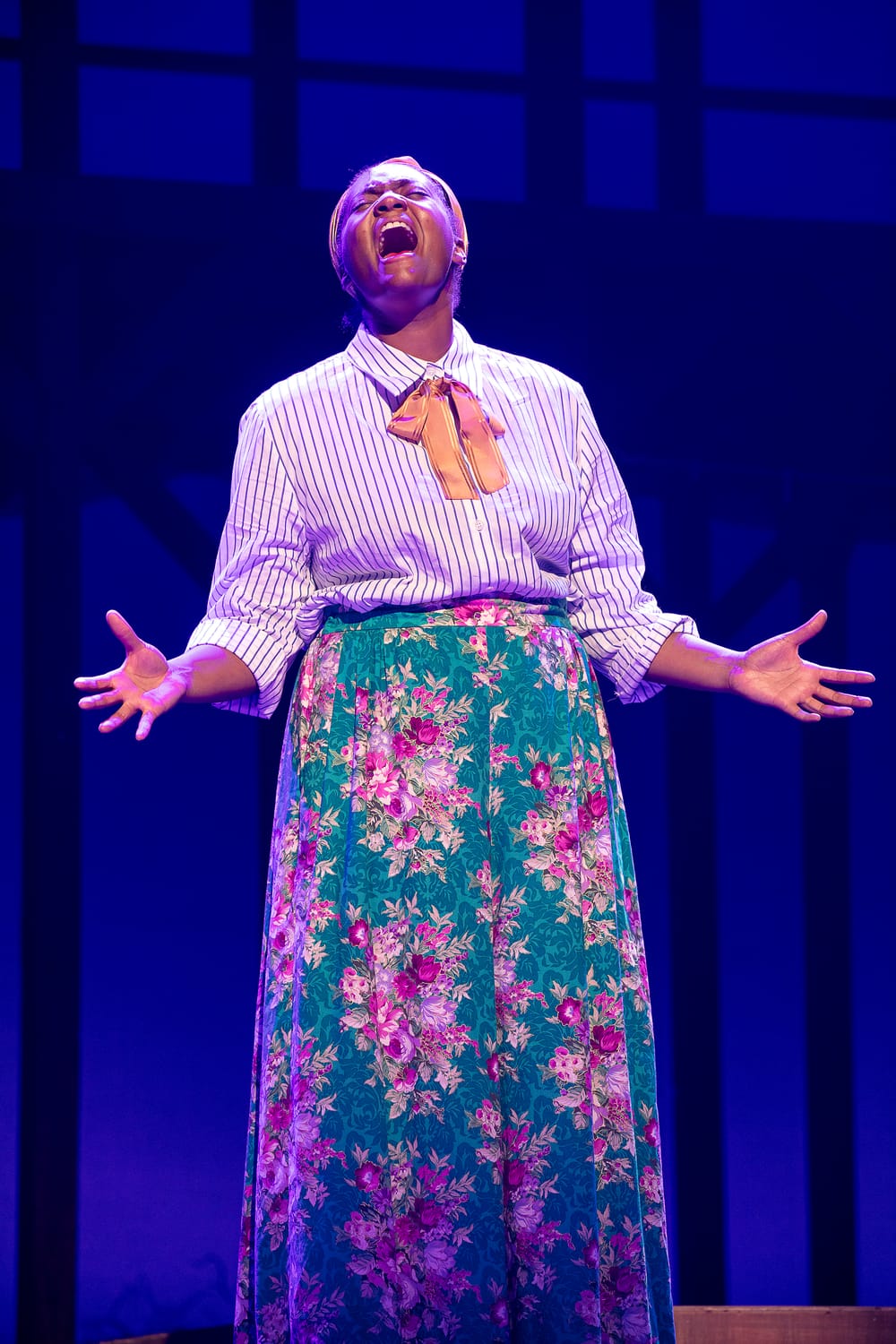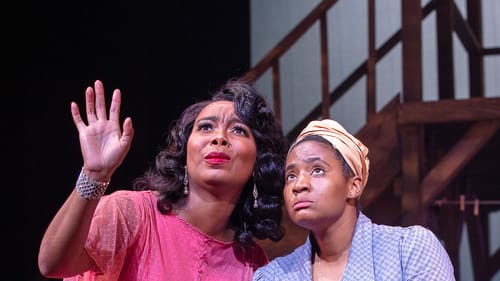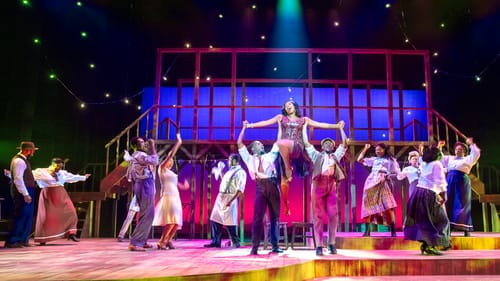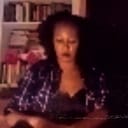Stay in the Loop
BSR publishes on a weekly schedule, with an email newsletter every Wednesday and Thursday morning. There’s no paywall, and subscribing is always free.
Celie’s story comes to the Center Valley stage
Pennsylvania Shakespeare Festival presents Alice Walker’s The Color Purple

Alice Walker's seminal 1982 novel, The Color Purple, has undergone numerous adaptations, beginning with the 1985 Steven Spielberg-directed film. In 2005, it became a Broadway musical backed by Oprah Winfrey; in 2015, John Doyle directed a revival; and then there was a 2023 movie musical based on the 2005 production. That adaptation is also the basis of the musical now onstage at Pennsylvania Shakespeare Festival (PSF), with a book by Marsha Norman and music and lyrics by Brenda Russell, Allee Willis, and Stephen Bray.
The novel opens in 1909 Georgia and follows Celie, a 14-year-old girl sexually abused by her stepfather Pa and then Mister, her common-law husband. The Color Purple is a survivor's journey. As Celie struggles through the despondency of her assault, she experiences relationships with other women that inspire her, including her sister Nettie, her "daughter-in-law" Sofia, and her on/off love interest Shug Avery. During the 1970s and 80s, Alice Walker's The Color Purple, Gloria Naylor's The Women of Brewster Place, and Toni Morrison's The Bluest Eye all textually processed generational racial trauma which manifested as incest, pedophilia, assault, and domestic violence.
I was eager for this production. My love for the story runs deep: in fourth grade, I read the original novel and from fifth grade on, I annually watched the Spielberg adaptation with my mother. I went on to minor in African American Studies and focused on representations of 20th-century African American women for my undergraduate major, and studied race and gender in the 18th and 19th centuries in my master’s program.
So I bring two perspectives to my review: one as a former academic of race and gender studies who read and watched The Color Purple during my formative years, and one as a standard theater-goer.
An academic look at The Color Purple
The crux of The Color Purple for me has always been Celie's isolation, assisted by an underlying melancholic feeling. The novel opens with her sexual assault on the first page. Subsequent pages detail more assault and hint that Nettie, her younger sister, might share that fate. The 1985 film and 2023 musical adaptation all showcase Nettie and Celie as children slightly separated from their community, particularly during the first 10 minutes.
Because the original text deals with so much abuse, I realize that can be difficult to process. I understand that audience members might need a mental break. However, I was disappointed in how this production frequently overrides the traumatic events with humor. Instead of Nettie assisting the teenaged Celie’s childbirth in a back room, this birth occurs during a joyful church service. After Celie (Jessica Johnson) reveals her sexual abuse, she immediately and happily sings she can’t wait until Nettie (Jessica Money) marries.

This production follows the structure of the novel and the 1985 and 2023 films, but it lacks the space for the cast and characters to experience the trauma and showcase those emotions. In the 2023 film, during the church scene, both Pa and Celie remain seated, sad, and abysmally apart with the camera emphasizing their isolation. In the PSF production, Celie merrily dances in church along with Nettie before giving birth.
A light touch on difficult subjects
During the abusive scenarios, the direction by Amina Robinson took a very light touch. On one hand, no, I don’t need to see a visual recreation of sexual assault. However, Ken Boyd as Pa and George L. Brown as Mister lack the menace that I feel necessary for characters who repeatedly rape teenagers. When Mister applies for Nettie’s hand, Pa acts like a normal dad by saying she’s too young. But this show misses the underlying horror: he’s basically saving his young stepdaughter for himself. In the novel, Mister is the “same shape” as Pa, which to me means he should be around the same age, or give off the same vibe. But here we get the super buff, super good-looking Brown while the male chorus saucily sings Mister “likes his bed real hot” (while overlooking that his bed is warmed by a coerced teen).
Although the timing is very smooth, the transitions are paced so close together that the subsequent palate-cleanser scenes shut down any emotional processing in audience members. Celie spitting in Old Mister’s drink is the utmost act of silent rebellion, but it serves more as a humorous aside in this production. When Sofia’s (K. Bernice) sisters rescue her from her abusive husband Harpo (Joel Oliver), Celie just dramatically shouts “Dear God.” But in the novel, God is initially the only one Celie can appeal to. After Celie becomes complicit in Sofia’s abuse, the performance should have showcased more emotional horror for the character.
There are so many moments where I feel this production avoids marinating in the necessary emotions. While it understandably keeps the audience from leaving in despair, even a 10-second pause could’ve made certain words more poignant.
The view from the audience
The audience absolutely LOVED this production. During intermission, people of all races shared how they felt impacted, and there was a two-minute standing ovation at the curtain call. That’s no surprise: Robinson won a directing Barrymore for her 2018 Color Purple at Norristown’s Theatre Horizon. Here, she effectively sets stage tableaus and fills the space, especially with veils during the “Africa (Part 1)” number. My favorite part of this production was the first half of Act Two. And “In Miss Celie’s Pants” is a great 1920s-style banger.
As Celie, Johnson has incredibly emotive vocals and is definitely a lead to hang your show on. During the middle of Act Two, I felt her character got a little lost, but she snapped back by “End Easter Dinner.” Ta-Tynisa Wilson is everything Shug Avery should be—sultry, comedic, and tons of fun. I am glad the production doesn’t underwrite Shug’s bisexuality. The church ladies ensemble is humorous and always on point. Bernice’s Sofia is excellent in her strength.

Choreographer Devon Sinclair showcases intricate group choreographies. However, I was disappointed that the West African dance scene used only three dancers instead of the entire ensemble. Jerrilyn Lanier Duckworth’s costumes perfectly reflect the fashions of the time. And my gosh, the variety of hairstyles that remain impeccable throughout is amazing.
A diverse creative team
My biggest pet peeve is an all-Black cast with an all-white production team (which this show avoids). Shout-out to PSF for using diverse talents not just onstage but behind the scenes, including intimacy director Renee Redding-Jones (who did a great job with difficult material), production stage manager Ashani Smith, music director Christie Chiles Twillie, sound designer Larry Fowler, assistant stage manager Jalon Payton, fight director Eli Lynn, lighting designer Alyssandra Docherty, and scenic designer Deb Kim Sivigny.
A well-done production
If you remember the trauma of the original text and 1985 film, worry not: this staging keeps that at bay. But theatrical portrayals of trauma can feel cathartic. I took this show’s eliding of the difficult emotions to heart because of a recent real-life experience: a white woman told me that Black people shouldn’t talk about social concerns (be they big or small) that cause feelings of trauma. In her words, it isn’t healthy and we should be silent instead. So I missed the experience I had with the original text.
But to be clear, this is a well-done production. If you want a fun night out, this is definitely for you. Even with the story truncated, it was clear that the entire audience was touched. If you get to the show, I hope that you can experience the same.
At top: Jessica Johnson as Celie in The Color Purple at Pennsylvania Shakespeare Festival in Center Valley, PA. (Photo by Kristy McKeever.)
What, When, Where
The Color Purple. Based on the book by Alice Walker, with a book by Marsha Norman, and music and lyrics by Brenda Russell, Allee Willis, and Stephen Bray; directed by Amina Robinson. Through August 4, 2024, at the Pennsylvania Shakespeare Festival’s Labuda Center for the Performing Arts, 2755 Station Avenue, Center Valley. (610) 282-WILL or pashakespeare.org.
Accessibility
The Pennsylvania Shakespeare Festival box office is able to accommodate requests for a wheelchair or companion seat, space for a service animal, a large-print program, or a headset for the assisted listening system.
Sign up for our newsletter
All of the week's new articles, all in one place. Sign up for the free weekly BSR newsletters, and don't miss a conversation.
 An Nichols
An Nichols